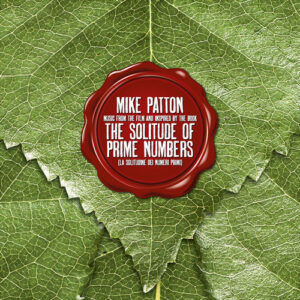Ever since the days of Faith No More, when the band used to regularly cover the theme to Midnight Cowboy (and whatever else was suitably grandiose to appear in the midst of one of their songs) to Fantomas’ ‘Director’s cut’ album, Mike Patton has shown an overwhelming fondness for soundtracks. Just recently that love has expanded with his providing the score to both ‘Crank 2’ and ‘A perfect place’ and now he returns, somewhat unexpectedly, with a body of work taken from the film (and inspired by the book) ‘the solitude of prime numbers’.
An almost typically a-typical choice for Patton, ‘the solitude of prime numbers’ is the debut novel from Italian writer Paulo Giordano, a particle physicist moonlighting as an author, which concerns the lives of two dysfunctional characters whose emotional scars from childhood dog their adult lives. Of the characters Mattia and Alice, Mattia is the most confused – a guilt ridden mathematics obsessive who comes to see the world through the prism of his favourite subject and it is from his awkward notions that the title of the book is taken. Such gritty subject matter, suffused as it is with an eccentric element, seems tailor made for Mike Patton’s chaotic musical vision, and so it proves over the course of this 16 track musical journey into the heart of the novel.
What immediately sets this apart is the sheer emotional content of the music. Mike Patton has clearly absorbed every nuance form the book and used it to create a remarkably restrained, remarkably expressive soundtrack that captures the tale of fragmenting youth and lost innocence. The opening track – ‘twin primes’ is a great example, a tune that speaks of innocence and childhood days, the breathy vocals that overlay the track maintain hints of Fantomas’ more outré moments, but never explode into the gleeful insanity that has been Mike’s trademark over the years and it is here, playing it straight, that Mike gathers a genuine emotional momentum behind his music. ‘Identity matrix’ is a rather more whimsical track that marries deranged electronic with lush orchestration before the music takes a more sinister turn with ‘method of infinite descent’. An eerie drone, there is a malevolent atmosphere to the track that sits at odds with the previous two tracks and makes the hair stand up on the back of your neck, before the stark tones of a piano break the mood on ‘contropositive’. It is these tracks, which showcase Mike Patton’s immense musical skill and diversity, that truly highlight what a treasure the man is and it is clear that crafting emotive, expressive music is another one of the many talents that he can content himself with having mastered.
It is on ‘Cicatrix’ that things really get creepy. Crawling strings intermingle with slithering synth lines to create the music of nightmares. The jarring tones immediately set the teeth on edge and you can only imagine the horrors that such music points to while your skin crawls and roils over your flesh. ‘Abscissa’ is no less moody, although it takes the form of a more traditional piece of music with strings and piano vying for supremacy as the music ebbs and flows. Things finally lighten with ‘isolated primes’, a gently reflective piece of music that seems to suggest a positive emotional breakthrough far removed from the crawling horrors of ‘cicatrix’. ‘Radius of convergence’ is the sound of rain falling upon a thousand wine glasses, all distant harmonics and subtle ambience, once again recalling the musical soliloquies of Aphex Twin contrasted with the horrific synth deviance of Wendy Carlos’ soundtrack to ‘a clockwork orange’. The sound of the sinister returns for ‘separatrix’ which sees the strings slithering towards a crescendo ever so slowly, dragging out the moment of release where the music finally reaches its peak and causing the sweat to gather in beads upon your forehead before we’re taken off to a chamber far away where a piano plays in the distance while we lie gasping on the floor trying just to gain our bearings… and so it goes, with each track twisting and developing in its own beautiful way until the closing strains of ‘weight of consequences’ (echoing the films perfectly balanced opening track) draws the disc to a close.
It is an astonishing journey. Mike Patton’s work does what the very best film soundtracks should do, which is to take the listener on a journey that is both intrinsically linked to the story but which also allows any number of personal permutations to twist and develop with the music. The soundtrack here tells the story, but it also flies free from that simple conceit and allows the listener to partake of the trip even if they’ve never seen the film or read the book. This is a masterly, indulgent (but not overly so), expressive piece of work that is best encountered in the absence of any other external stimuli and it reminds us once again how lucky we are that Mike Patton is free to indulge his creativity.




